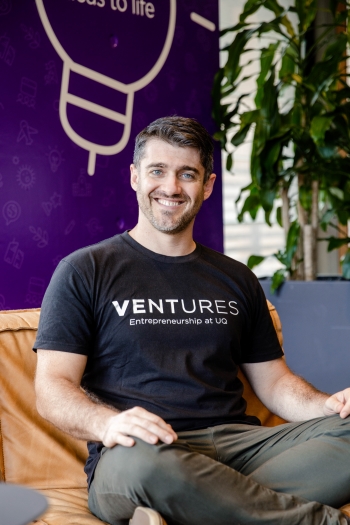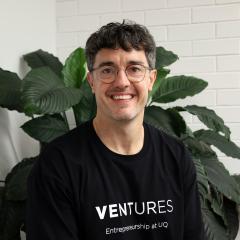Inside UQ Research: Bringing healthcare innovation out of the lab
Welcome to a new series where we shine a light on bold ideas being brought to life through research at The University of Queensland. Research can be the sparks of change that have the power to shape industries, communities, and futures.

To kick things off, we’re celebrating someone from our own Ventures community: Tomas, our former UQ Ventures Manager, who’s now diving deep into a PhD exploring one of the biggest roadblocks in innovation—how we get more research out of the lab and into the world.
While Tomas has stepped into this new chapter, he continues to work with Ventures to deliver programs and engage with our team. His research, based within the Dementia and Neuro Mental Health Research Unit at UQCCR, focuses on how we can better support healthcare researchers to scale their work, build sustainable business models, and bring life-changing innovations to the people who need them most.
At its heart, this is about reimagining the intersection between research and entrepreneurship—and we’re so proud to see Tomas continuing to lead that charge.
Role: HDR Scholar, Dementia and Neuro Mental Health Research Unit, UQCCR, School of Medicine.
Title of Research: What are the critical factors influencing the creation of business models during the research translation process?
Research Aim: Help healthcare researchers take innovations to market in a simpler and faster way.
Problem: Most healthcare research projects never go beyond a small pilot stage. They struggle to scale up and find a sustainable business model to take their innovations to market. In 2022, the Australian higher education sector spent almost 14 billion dollars in Research and Development (R&D), yet only a handful of projects will get to market. This represents a huge untapped potential that we can unlock.
Impact: With one of the strongest higher education systems in the world, there is the opportunity to unlock a huge number of innovations that can create products, programs and new practices. These outcomes will improve the lives of Australians through new, improved care, the creation of jobs, and a stronger education sector.
What excites me: There has been a push to turn researchers into entrepreneurs, which hasn’t seemed to work. I think there is a need to discover new business frameworks that are tailored to the research community, accepting researchers as they are, with their skills, what is important to them and how they organise and work. This exploration also means rethinking what the outcome of a business model is, challenging revenue and profit structures, and rethinking creatively how we can capture value from the innovations we create. There is endless potential in combining business frameworks and healthcare research. However, it has to be a true balance and not a mere imposition of business ways into healthcare research.
What I am actually doing: I am part of a healthcare research unit that is creating new solutions to improve the lives of people living with dementia and Parkinson’s disease. I am researching how we can take these innovations to market in a way that is sustainable and accessible to everyone who needs them. You can learn more about the research here.

